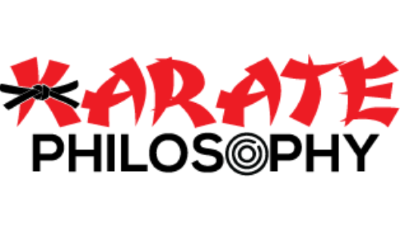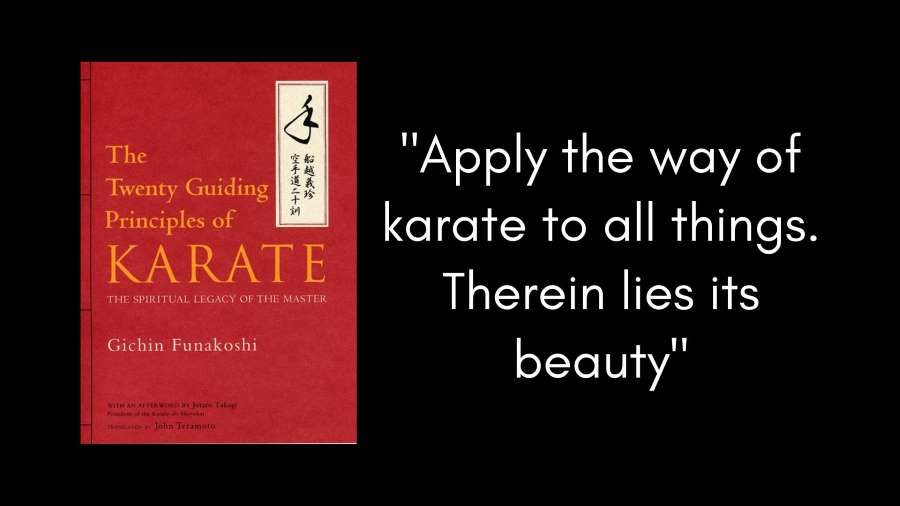“Apply the way of karate to all things, therein lies its beauty” is the tenth of the twenty precepts of karate written by Gichin Funakoshi.
The Japanese version of this precept is “一、凡ゆるものを空手化せよ其処に妙味あり Hitotsu, arayuru mono o karate kaseyo; soko ni myōmi ari“.
There are a few other translations of this precept:
- Transform everything into karate; therein lies its exquisiteness
- Put your everyday living into karate and you will find “myo” (subtle secrets)
- Put your everyday living into karate, and you will find the secret
- Put karate into everything you do and you will find the subtle secrets (the ideal state of existence, the exquisite beauty).
In essence, Funakoshi encourages us to apply the concepts, principles, and values that we learn in karate to our everyday living and realize the potential that karate has to offer.
Most of us who learn karate will never have to use it in our lives to defend ourselves. But it doesn’t mean that we have all wasted our time. Far from it, karate will have a positive impact on us in many ways from improving our physical fitness and mental strength to increasing focus, resilience, discipline, and self-confidence.
Furthermore, if we consciously try to apply what we learn from karate to our daily life, its benefits can be multifold. Let’s have a look at a few examples below.
- Being respectful
- Being present
- Keeping an open mind
- Developing self-discipline and perseverance
- Mastering the basics
Being respectful
In karate, as part of our practice, we learn to be respectful to our instructors, training partners, the place of training, and the training equipment.
If we could apply this precept to a broader context, it would mean we show respect to others, regardless of their background, status, or beliefs. Treating others with respect means treating them the way we want to be treated and valuing their opinions and feelings, even if they differ from our own.
Not everyone will show the same level of respect in return but that does not matter: knowing that we have done our best, we will be at peace with ourselves and we can free ourselves from the burden of negative emotions.
This will allow us to focus on the positive aspects of our lives and relationships, rather than dwelling on past wrongs or other people’s poor attitudes. This is also a sign of emotional maturity and inner strength. And our lives will be better and richer because of it.
Being present
In karate, we learn to be in the present moment at all times, focusing on one technique, one drill or one fight at a time. If we don’t, we are unlikely to perform our best, injury is more likely to happen, and winning and losing can be determined by a split-second lapse of concentration.
Being in the present moment is not an easy thing to achieve in today’s fast-paced world that is full of distractions. But if we can work on being the here and now in our daily life, it can help us in our karate and vice versa.
There are many benefits to living in the present moment, including:
- Reduced stress and anxiety: When we focus on the present moment, we’re less likely to dwell on the past or worry about the future and that can help us reduce stress and anxiety
- Improved relationships: By being fully present with others, we are more likely to listen attentively, fully understand their concerns, and help them when they need and hence improve our relationships with them
- Greater enjoyment of life: By focusing on the present moment, we can fully engage in our experiences and appreciate the small things in life, which can bring us greater joy and satisfaction
- Improved performance: As mentioned above, by focusing on one task at a time, we can improve our concentration and overall performance
- Better physical health: Living in the present moment can help reduce stress, which can have a significant positive impact on our physical health.
Here are a few tips to help you be more present in the moment:
- Avoid multitasking and try to do one thing at a time, for example, when we eat, we eat and avoid scrolling on our phones, reading the news, or watching movies
- Practice meditation, focus only on our deep breathing, and let go of all our concerns, worries or problems
- Let go of our past. There is a time and place when we need to review our past but most of the time we either regret what we have done or dwell on our failures and mistakes. Letting go of our past lightens us and allows us to focus on the issue at hand
- Get rid of distractions, for example, turn off our phones for a period of time in the day, take a social media break, or take a mindful nature walk
- Practice gratitude and learn to be grateful for what we have rather than what we have not.
Keeping an open mind
Keeping an open mind or having a beginner mindset (初心 – shoshin) is very important in karate and in life. Without adopting this mindset, we cannot reach our full growth potential.
Having a beginner’s mindset means being open-minded and free from assumptions, preconceptions, and judgments.
When we adopt this mindset, we are able to absorb new information and knowledge better and observe and see things as they are rather than letting them be filtered or distorted by our prior experience and knowledge.
Whenever we receive instructions in our dojo, visit another dojo, or attend a seminar, we should try to empty our minds and assume we know nothing about the subject at hand (like when we are a white belt) and, most definitely, we will learn a lot more, remember more of what we learn and benefit more.
This important concept is important for our karate as well as for all other areas in our life including study, work, and relationships.
Adopting a beginner’s mindset is not easy, however. We are all unique products of our upbringing, education, and experience and, naturally, we would want to evaluate or make judgments about what we are told. But this mindset can be acquired with practice and patience.
Developing self-discipline and perseverance
There is no doubt that karate will improve our self-discipline and perseverance.
Consistently turning up to train, rain hail or shine; following structured training programs and routines; and setting and working toward specific goals (e.g. new belt, mastering a specific technique, or winning certain places in competitions) all help develop our self-discipline.
If we apply this kind of dedication, effort, and approach to other areas in our life whether in fitness, education, career, wealth, or relationships, we will have a much better chance of success.
In addition, the practice of karate emphasizes the value of perseverance.
Through karate, we know that progress is made through hard work and determination. We know that success does not come easy and that setbacks and failures are part of the learning process. Applying this mindset to our daily life can help us overcome obstacles and achieve our goals, no matter how big or small.
Mastering the basics
The road to karate mastery is through mastering the basics and that is the reason why we spend so much time practicing kihon in the dojo.
If our basics are strong and if we ever need to use karate in real life to defend ourselves, we have a better chance of finishing the fight and resolving the conflict quickly with precise and effective techniques.
The same thing applies to any field that we wish to excel in, whether it is drawing, sculpting, finance, or computing science. Without a solid foundation to build on, we cannot progress toward more advanced skills and knowledge and achieve the excellence and success that we desire.
Next time we get frustrated with practicing basics, whether in karate, work or hobbies, let’s remember that without a good grasp of the fundamentals, we cannot progress further.
If we ever get stuck with an advanced kata or a technical concept at work, it may be not that the kata or the concept itself is difficult but perhaps there are holes in our basics that we need to fill.
Conclusion
I could go on with many other concepts and principles but you get the general idea.
It’s not how much we learn but how much we can actually apply what we learn to practice. Karate concepts, principles, and values can be applied to all aspects of our lives, helping us achieve more and lead better, happier, and more fulfilling lives.
The wisdom of a person who masters in any art is reflected in his every attitude.
Unknown
All Posts in the Series:
Precept 1: Do Not Forget that Karate-do Begins and Ends with Rei
Precept 2: There Is No First Strike in Karate
Precept 3: Karate Stands on the Side of Justice
Precept 4: First Know Yourself Then Know Others
Precept 5: Mentality Over Technique
Precept 6: The Mind Must Be Set Free
Precept 7: Calamity Springs from Carelessness
Precept 8: Karate Goes Beyond the Dojo
Precept 9: Karate Is a Lifelong Pursuit
Precept 10: Apply the Way of Karate to All Things, Therein Lies Its Beauty
Precept 11: Karate Is Like Boiling Water: Without Heat, It Returns to Its Tepid State
Precept 12: Do Not Think of Winning, Think, Rather, of Not Losing
Precept 13: Make Adjustments According to Your Opponent
Precept 14: The Outcome of a Battle Depends on How One Controls Truth and Fiction
Precept 15: Think of the Opponent’s Hands and Feet as Swords
Precept 16: When You Step Beyond Your Own Gate, You Face a Million Enemies
Precept 17: Kamae Is For Beginners; Later, One Stands In Shizentai
Precept 18 – Perform Kata Exactly; Actual Combat Is Another Matter
Precept 20: Be Constantly Mindful, Diligent, and Resourceful in Your Pursuit of the Way
References:
Gichin Funakoshi (1938). The Twenty Guiding Principles of Karate
How to Live in the Moment: 35+ Tools to Be More Present
How To Develop A Beginner’s Mindset: A Critical Trait In Business Today
States of Mind in Budo: Shoshin, Mushin, Fudoshin, and Zanshin

